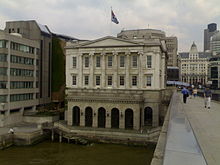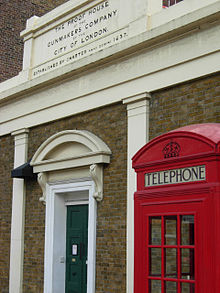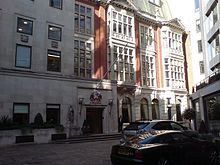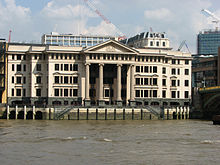- Livery Company
-
The Livery Companies are 108 trade associations in the City of London,[1] almost all of which are known as the "Worshipful Company of" the relevant trade, craft or profession. The medieval Companies originally developed as guilds and were responsible for the regulation of their trades, controlling, for instance, wages and labour conditions. Until the Protestant Reformation, they were closely associated with religious activities, notably in support of chantry chapels and churches and the observance of ceremonies, notably the mystery plays.
Some livery companies continue to have a professional role today (for example, the Scriveners' Company admits senior members to that profession, the Apothecaries' Company awards post-graduate qualifications in some medical specialties, and the Hackney Carriage Drivers' Company is composed of those who have learned 'the knowledge' and are licensed London taxicab drivers). Other Livery Companies have become purely charitable foundations (such as the Longbow Makers' Company). Most Companies, particularly those formed in more recent times, are primarily social and charitable organisations. The active Companies play an important part in social life and networking in the City and have a long history of cultural patronage, and control of the City of London Corporation (which still functions as a local authority with extensive local government powers).
After the Fan Makers' Company was established in 1709 (and later granted livery status in 1809), no new companies were formed for over 100 years until the Master Mariners in 1926 (granted livery in 1932). Post-1926 Companies are often called modern Livery Companies.
Formed in 1999, the Company of Security Professionals became the 108th Livery Company on 19 February 2008 when the Court of Aldermen approved their petition for livery. Many professions, such as solicitors and chartered accountants, have established new guilds with an aim of ultimately being granted livery. Two bodies, the Worshipful Company of Parish Clerks and the Company of Watermen and Lightermen, are recognised as City Companies but without the grant of livery for historical reasons; three further guilds (the Company of Educators; Public Relations Practitioners; and Arts Scholars, Dealers and Collectors) aim to obtain a grant of livery.
Contents
Governance
Livery Companies are governed by a Master (known in some Companies as the Prime Warden or Bailiff), a number of Wardens (who may be known as the Upper, Middle, Lower, or Renter Wardens), and a Court of Assistants, which elects the Master and Wardens. The chief operating officer of the Company is known as the Clerk.
Members generally fall into two categories: freemen and liverymen. One may become a freeman, or acquire the "freedom of the company", upon fulfilling the company's criteria: traditionally, one may be admitted by "patrimony", if either parent was a liveryman of the company; by "servitude", if one has served the requisite number of years as an apprentice of the company; or by "redemption", if one pays a fee. (The Company may also vote to admit individuals as honourary freemen.) Freemen generally advance to becoming liverymen by a vote of the court of the Company. Historically, only liverymen could take part in the election of the Lord Mayor, the Sheriffs, and the other traditional officers of the City.
Livery halls
Many Companies still operate a hall, where members and their guests can be entertained and company business transacted. Among the earliest Companies known to have halls were the Merchant Taylors and Goldsmiths in the 14th century, but neither their nor other Companies' original halls remain; the few survivors of the Great Fire of London, along with many reconstructions, were destroyed during the Blitz of the Second World War.
Today, only some forty Companies have halls in London, which are commonly available for business and social functions, such as commercial and society meetings and dinners; the oldest extant hall now is that of the Worshipful Society of Apothecaries, dating from 1672. Companies that do not have their own hall usually borrow another Company's for social occasions, or share premises on a semi-permanent basis, such as the Spectacle Makers' Company which resides in part of the Apothecaries' hall. One Livery Company (the Glaziers) has their hall on the South Bank of the River Thames at London Bridge, and is technically outside the City of London.
Precedence
In 1515, the Court of Aldermen of the City of London settled an order of precedence for the forty-eight Livery Companies then in existence, which was based on the Companies' economic or political power. The first twelve Companies are known as the Great Twelve City Livery Companies. There are now 108 Companies, so the Order of Precedence is sometimes reviewed.
The Merchant Taylors and the Skinners have always disputed their precedence, so once a year (at Easter) they exchange sixth and seventh place. This alternation is one of the theories for the origin of the phrase "at sixes and sevens", as the master of the Merchant Taylors has asserted a number of times, although the first use of the phrase may have been before the Taylors and the Skinners decided to alternate their position.[2]
List of Companies, in order of precedence
 The Worshipful Company of Fishmongers, whose hall is pictured, ranks fourth in the order of precedence of 1515.
The Worshipful Company of Fishmongers, whose hall is pictured, ranks fourth in the order of precedence of 1515.
 The Worshipful Company of Gunmakers, which is positioned 73rd in the order of precedence, has been based at Proof House for over 300 years.
The Worshipful Company of Gunmakers, which is positioned 73rd in the order of precedence, has been based at Proof House for over 300 years.
- The Worshipful Company of Mercers (general merchants)
- The Worshipful Company of Grocers
- The Worshipful Company of Drapers (wool and cloth merchants)
- The Worshipful Company of Fishmongers
- The Worshipful Company of Goldsmiths
- The Worshipful Company of Merchant Taylors* (tailors)
- The Worshipful Company of Skinners* (fur traders)
- The Worshipful Company of Haberdashers (sellers of sewing articles)
- The Worshipful Company of Salters (traders of salts and chemicals)
- The Worshipful Company of Ironmongers
- The Worshipful Company of Vintners (wine merchants)
- The Worshipful Company of Clothworkers
- The Worshipful Company of Dyers
- The Worshipful Company of Brewers
- The Worshipful Company of Leathersellers
- The Worshipful Company of Pewterers (tin craftsmen)
- The Worshipful Company of Barbers (and surgeons and dentists)
- The Worshipful Company of Cutlers (knife, sword and cutlery makers)
- The Worshipful Company of Bakers
- The Worshipful Company of Wax Chandlers (wax candle makers)
- The Worshipful Company of Tallow Chandlers (tallow candle makers)
- The Worshipful Company of Armourers and Brasiers (armour makers and brass workers)
- The Worshipful Company of Girdlers (swordbelt and dressbelt makers)
- The Worshipful Company of Butchers
- The Worshipful Company of Saddlers
- The Worshipful Company of Carpenters
- The Worshipful Company of Cordwainers (fine leather workers)
- The Worshipful Company of Painter-Stainers
- The Worshipful Company of Curriers (tanned leather dressers)
- The Worshipful Company of Masons
- The Worshipful Company of Plumbers
- The Worshipful Company of Innholders
- The Worshipful Company of Founders (brass and bronze workers)
- The Worshipful Company of Poulters
- The Worshipful Company of Cooks
- The Worshipful Company of Coopers (barrel makers)
- The Worshipful Company of Tylers and Bricklayers
- The Worshipful Company of Bowyers (long bow makers)
- The Worshipful Company of Fletchers (arrow makers)
- The Worshipful Company of Blacksmiths
- The Worshipful Company of Joiners and Ceilers (wood craftsmen)
- The Worshipful Company of Weavers, the most ancient Company
- The Worshipful Company of Woolmen
- The Worshipful Company of Scriveners (court document writers and notaries public)
- The Worshipful Company of Fruiterers
- The Worshipful Company of Plaisterers (plasterers)
- The Worshipful Company of Stationers and Newspaper Makers
- The Worshipful Company of Broderers (embroiders)
- The Worshipful Company of Upholders (upholsterers)
- The Worshipful Company of Musicians
- The Worshipful Company of Turners (lathe operators)
- The Worshipful Company of Basketmakers
- The Worshipful Company of Glaziers and Painters of Glass
- The Worshipful Company of Horners (horn workers and plastic)
- The Worshipful Company of Farriers (horseshoe makers and horse veterinarians)
- The Worshipful Company of Paviors (road and highway pavers)
- The Worshipful Company of Loriners (harness makers)
- The Worshipful Society of Apothecaries (medical practitioners and pharmacists)
- The Worshipful Company of Shipwrights
- The Worshipful Company of Spectacle Makers
- The Worshipful Company of Clockmakers
- The Worshipful Company of Glovers
- The Worshipful Company of Feltmakers (hat makers)
- The Worshipful Company of Framework Knitters
- The Worshipful Company of Needlemakers
- The Worshipful Company of Gardeners
- The Worshipful Company of Tin Plate Workers
- The Worshipful Company of Wheelwrights
- The Worshipful Company of Distillers
- The Worshipful Company of Pattenmakers (wooden shoe makers)
- The Worshipful Company of Glass Sellers
- The Worshipful Company of Coachmakers and Coach Harness Makers
- The Worshipful Company of Gunmakers
- The Worshipful Company of Gold and Silver Wyre Drawers (makers of thread for uniforms)
- The Worshipful Company of Makers of Playing Cards
- The Worshipful Company of Fanmakers
- The Worshipful Company of Carmen
- The Honourable Company of Master Mariners, the first of the 20th-century Companies
- The City of London Solicitors' Company
- The Worshipful Company of Farmers
- The Guild of Air Pilots and Air Navigators
- The Worshipful Company of Tobacco Pipe Makers and Tobacco Blenders
- The Worshipful Company of Furniture Makers
- The Worshipful Company of Scientific Instrument Makers
- The Worshipful Company of Chartered Surveyors
- The Worshipful Company of Chartered Accountants in England and Wales
- The Worshipful Company of Chartered Secretaries and Administrators
- The Worshipful Company of Builders Merchants
- The Worshipful Company of Launderers
- The Worshipful Company of Marketors
- The Worshipful Company of Actuaries
- The Worshipful Company of Insurers
- The Worshipful Company of Arbitrators
- The Worshipful Company of Engineers
- The Worshipful Company of Fuellers
- The Worshipful Company of Lightmongers
- The Worshipful Company of Environmental Cleaners
- The Worshipful Company of Chartered Architects
- The Worshipful Company of Constructors
- The Worshipful Company of Information Technologists
- The Worshipful Company of World Traders
- The Worshipful Company of Water Conservators
- The Worshipful Company of Firefighters
- The Worshipful Company of Hackney Carriage Drivers (licensed London taxicab drivers)
- The Worshipful Company of Management Consultants
- The Worshipful Company of International Bankers
- The Worshipful Company of Tax Advisers
- The Worshipful Company of Security Professionals
Note: *The Skinners' and Merchant Taylors' Companies alternate position once per year.
City Companies without grant of livery
- The Worshipful Company of Parish Clerks
- The Company of Watermen and Lightermen
Both of these Companies will never apply for livery due to their ancient status and custom.
A guild which is recognised by the Court of Aldermen as a 'London Guild' applies to the Court to become 'A Company without Livery'. After a term of years the Company applies to the Court for livery status, at which point it adopts the name "Worshipful Company of ... ".
Other guilds aiming to obtain a grant of livery
- The Guild of Public Relations Practitioners
- The Guild of Arts Scholars, Dealers and Collectors
- The Company of Educators
See also
Neither the 'City Livery Club' nor 'The Guild of Freemen of the City of London' is recognised as a 'guild' by the City; they are merely social clubs.
References
External links
Mercers · Grocers · Drapers · Fishmongers · Goldsmiths · Merchant Taylors · Skinners · Haberdashers · Salters · Ironmongers · Vintners · Clothworkers · Dyers · Brewers · Leathersellers · Pewterers · Barbers · Cutlers · Bakers · Wax Chandlers · Tallow Chandlers · Armourers and Brasiers · Girdlers · Butchers · Saddlers · Carpenters · Cordwainers · Painter-Stainers · Curriers · Masons · Plumbers · Innholders · Founders · Poulters · Cooks · Coopers · Tylers and Bricklayers · Bowyers · Fletchers · Blacksmiths · Joiners and Ceilers · Weavers · Woolmen · Scriveners · Fruiterers · Plaisterers · Stationers and Newspaper Makers · Broderers · Upholders · Musicians · Turners · Basketmakers · Glaziers and Painters of Glass · Horners · Farriers · Paviors · Loriners · Apothecaries · Shipwrights · Spectacle Makers · Clockmakers · Glovers · Feltmakers · Framework Knitters · Needlemakers · Gardeners · Tin Plate Workers · Wheelwrights · Distillers · Pattenmakers · Glass Sellers · Coachmakers and Coach Harness Makers · Gunmakers · Gold and Silver Wyre Drawers · Makers of Playing Cards · Fanmakers · Carmen · Master Mariners · Solicitors · Farmers · Air Pilots and Air Navigators · Tobacco Pipe Makers and Tobacco Blenders · Furniture Makers · Scientific Instrument Makers · Chartered Surveyors · Chartered Accountants · Chartered Secretaries and Administrators · Builders Merchants · Launderers · Marketors · Actuaries · Insurers · Arbitrators · Engineers · Fuellers · Lightmongers · Environmental Cleaners · Chartered Architects · Constructors · Information Technologists · World Traders · Water Conservators · Firefighters · Hackney Carriage Drivers · Management Consultants · International Bankers · Tax Advisers · Security Professionals
 Category:Organisations based in the City of LondonCategories:
Category:Organisations based in the City of LondonCategories:- Local government in London
- Livery companies
- City of London
Wikimedia Foundation. 2010.



